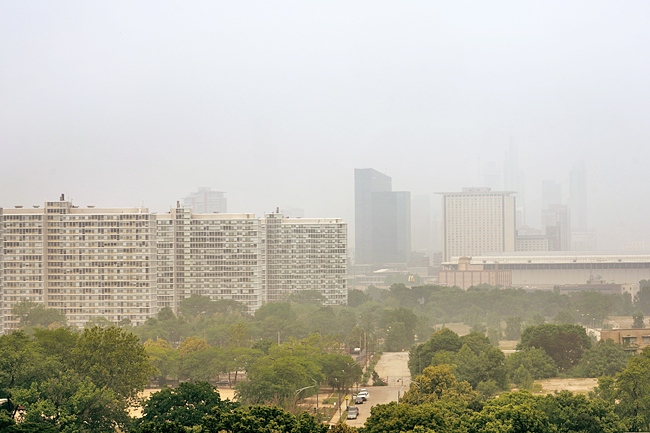CHICAGO (AP) – Drifting smoke from the ongoing wildfires across Canada is creating curtains of haze and raising air quality concerns throughout the Great Lakes region and in parts of the central and eastern United States (US).
The Environmental Protection Agency’s AirNow.gov site showed parts of Illinois, lower Michigan and southern Wisconsin had the worst air quality in the US on Tuesday afternoon, and Chicago, Detroit and Milwaukee had air quality categorised as “very unhealthy.”
In Minnesota, a record 23rd air quality alert was issued on Tuesday through late yesterday night across much of the state, as smoky skies obscure the skylines of Minneapolis and St Paul. Michigan’s Department of Environment, Great Lakes, and Energy issued an air quality alert for the entire state.
Wisconsin’s Department of Natural Resources also issued an air quality advisory for the state.
In Chicago, officials urged young people, older adults and residents with health issues to spend more time indoors.
“Just driving into the zoo … you could just see around the buildings, kind of just haze,” said Shelly Woinowski, who was visiting the Lincoln Park Zoo in Chicago.

Some daycare centres in the Chicago area have told parents that their children will remain indoors on Tuesday due to the poor air quality, while one youth sports club said it adjusted its activities to add more time indoors.
“As these unsafe conditions continue, the city will continue to provide updates and take swift action to ensure that vulnerable individuals have the resources they need to protect themselves and their families,” Mayor Brandon Johnson said in a release.
In the Milwaukee area, Flight for Life Wisconsin was unable to respond to a motorcycle-van crash because the Federal Aviation Administration requires 3.2 kilometres (km) visibility, and the visibility was reduced to three-quarters to 1.2-2.4km because of the hazy skies, Executive Director Leif Erickson said.
Fires in northern Quebec and low pressure over the eastern Great Lakes are sending smoke through northern Michigan, and across southern Wisconsin and Chicago, said a meteorologist with the National Weather Service Bryan Jackson.
Jackson added that a north wind would push the smoke further south, moving into Illinois, Indiana and Kentucky later on Tuesday and overnight.
The Canadian Interagency Forest Fire Centre reported on Monday that 76,129 square kilometres (km2) of land including forests has burned across Canada since January 1. That exceeds the previous record set in 1989 of 75,596km2, according to the National Forestry Database.
Nationally, there are currently 490 fires burning, with 255 of them considered to be out of control.
Even recent rainfall in Quebec likely won’t be enough to extinguish the wildfires ravaging the northern part of that province, but the wet weather could give firefighters a chance to get ahead of the flames, officials said on Tuesday.






